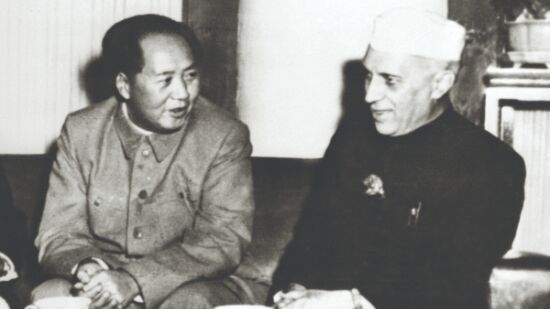Of Congress and cowards
- By : Anirban Ganguly
- Category : Articles

Conservative estimates say 52 RSS ‘swayamsevaks’ laid down their lives supporting and assisting the army along the border during the Chinese aggression of 1962. That story is yet to be narrated in its entirety. Perhaps someday it will be recorded and told. These ‘swayamsevaks’ were brave-hearts and did not back-pedal in carrying out their inner calling of defending ‘Bharatmata.’
On the other hand, in 1962 most of the Congress leadership and its ministers, especially in the border state of Assam did not display such valour. They were cowards who actually abandoned their people and ran away once the Chinese had advanced into the state. The issue of Congress cowardice came up in Parliament when Rajya Sabha was discussing the Chinese cease-fire proposals on December 12, 1962. A youthful Chandra Shekhar, who had made his debut in the Upper House spoke of how the situation in Tezpur had deteriorated and continued to be bad. Speaking of his recent visit to that crucial town, Chandra Shekhar told Nehru, “I do not want to repeat all those stories which happened there and I think the Prime Minister should not force Members to repeat all those stories” and that things were not bright in Assam. General Secretary of Republican Party of India (RPI), Baurao Khobragade, then Member of the Upper House from Maharashtra, taking on Nehru on the issue pointed out that there were reports that “two ministers of the Assam Government were present in Tezpur and that they had left Tezpur at that time, and, therefore, there was a collapse of administration in Assam.” Khobragade wanted to know from the Prime Minister that though the action was taken against the Deputy Commissioner who had run away, “What action has been taken against these two ministers of the Assam Government who ran away from Tezpur which led to the collapse of the administration in Tezpur?” Nehru of course vehemently denied that such a thing happened, he found the charge “completely unfounded and untrue”, Chandra Shekhar retorted that the whole of Tezpur believed it to be true!
Naturally, Nehru could not accept the truth of Congress ministers being cowards, since he had himself displayed great cowardice in face of Chinese aggression by abandoning the people of Assam. In his infamous “Farewell Broadcast” on the night of November 20, 1962, addressed to the people of Assam, Nehru had completely demoralised Assam when he said that “we feel very much for them…We may not be able to succeed in what we try because of various factors and the overwhelming number of Chinese forces…” Before he had uttered these words a cowering Nehru had already “approved of the preposterous proposal” that the “civil administration should be withdrawn from any area which the Chinese were likely to occupy immediately.” The people of Tezpur were abruptly conveyed that their Government “was no longer responsible for them” and “currency notes in the treasury were burnt; jails were opened, hospitals were emptied, even mental patients discharged.” Eye witness accounts and reports percolating through spoke of utter chaos, the people left to fend for themselves with no succour, no food even for infants. It was a coward who had abandoned his brave and trusting people.
Rahul Gandhi’s great grandfather Nehru was, in fact, the chief coward among Congressmen. There are a number of historic examples of his cowardice, but let us limit ourselves to the events of 1962. Nehru always blanketed his cowardice with false bravado and rhetoric. On October 12, 1962, just before emplaning for a four-day tour of Sri Lanka, Nehru told the posse of reporters at the airport, that “he had issued instructions to the army that the intruding Chinese should be thrown out.” It was a thoughtless — in 15 minutes will throw out the Chinese — moment and the consequences were there for all to see in the coming days. His essential cowardice all through the 1950s pushed Nehru to disregard, deny and suppress reports of China gobbling up Indian land and of it building a highway across Aksai- Chin. So prominent was the coward in him when it came to China that he even refused to send reconnaissance aircraft to verify reports of the Aksai Chin highway and waited till it had become a ‘fait accompli’.
As early as 1959, when the Chinese threatened to violate the McMahon Line and come into India, an intimidated Nehru immediately ordered the halting of patrolling along the Ladakh border. His cowardice led Nehru to deny this to Parliament, when on November 19, 1959, in a discussion in the Lok Sabha, Atal Bihari Vajpayee asked him point-blank, whether “it is not a fact that the Indian border police have stopped patrolling the traditional border in Ladakh after the ultimatum given by the Chinese on October 26 that if they continue to patrol on the traditional border they will violate the McMahon Line and come into India?” Nehru’s response was coward-like, “I am not aware of any ultimatum. But it is true that in one of their communications they said something like what the Honourable Member has said…”
Whenever anyone in Parliament urged Nehru to explore support and defence aid from friendly countries or asked him whether he had seriously considered these, he would lampoon and lambast them. While he did precious little to bolster India’s defence capacities, Nehru found it absurd that India should “go about seeking military aid from others to defend ourselves.” Living in a make-belief world, he thought that his overrated “unaligned policy” was not only “being recognised everywhere as the right policy” but was “spreading all over the world [and] even those stout and big countries that are aligned have come to respect it”, he told Parliament in August 1962. Within a few months, he was to be rudely shaken out of this fantasy.The coward in Nehru always advocated the need to protect others honour rather defend India’s interests. So scared was Nehru to offend the Chinese, that his Government deliberately avoided investing in the creation of India’s defence infrastructure along the border. American author Bruce Reidel notes for instance, that “Indians had not invested sufficient efforts in building roads and airfields near the border so their supply lines (in October 1962) were inadequate in getting ammunition and other equipment to the frontline troops in combat”, while the Chinese had “made the building of roads and other supply facilities a high priority since they entered Tibet in 1950.”
Throughout the late 1950s, Nehru derided those in the opposition who ventured to make suggestions of exploring defence aid from friendly foreign countries. Even when the Chinese threat had become imminent, Nehru caustically castigated those who advocated this line, that “I regret to say that the opposition does not even have an idea of what a modern mind is, much less possess it.” Yet at the height of the crisis he was forced to beseech the Kennedy administration to provide urgent and emergency succour, his “unaligned policy” had fallen through. The coward in him was so shaken to see the policy of appeasement fail that it had lost all proportion when asking for American aid. The letters he wrote to President Kennedy expressed the mind of a coward who had come face to face with his own cowardice. So devastated was Nehru that he asked Kennedy for military aid equivalent to, as Riedel notes, “350 combat aircraft and crews, twelve squadrons of fighter aircraft with twenty four-jets in each and two bomber squadrons. At least 10,000 personnel would be needed to staff and operate the jets, provide radar support, and conduct logistical support for the operation.” BK Nehru, then India’s Ambassador to Washington and Jawahar’s nephew was stunned to see the contents of the letter and years later confided to an American historian that “Nehru must have been exhausted and psychologically devastated by the news of India’s defeat” when he wrote these letters to Kennedy. In Parliament on November 19, 1962, a chastised Nehru, in answer to questions put to him by Hari Vishnu Kamath and Hem Barua, on aid being procured from abroad, replied that “We should take every conceivable and possible measure to meet this emergency and this crisis, and we are trying to get all the possible help we can from friendly countries. There is no limitation about that of any kind.”
It was Nehru’s innate cowardice combined with a misplaced idealism and a hollow, self-obsessed morality that led to the debacle of 1962. This innately coward nature would be visible, over the decades, in Nehru’s heirs as well. It would become endemic to the ‘Family’ that would rule the Congress. In each of Nehru’s heirs, a coward lurked and surfaced at crucial times in India’s history to the detriment of her national interest and priorities.

















